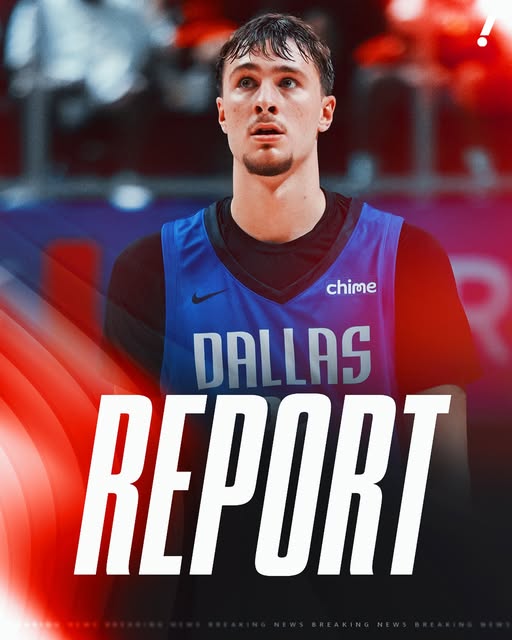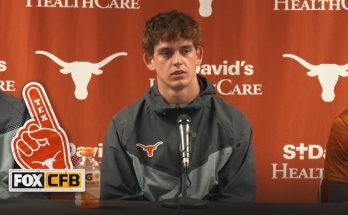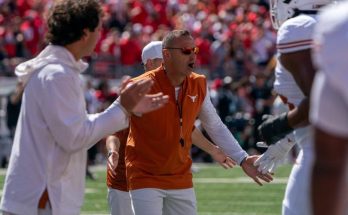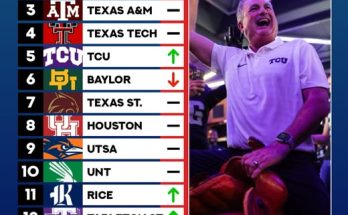The Dallas Mavericks have made a stunning decision that reverberated across the NBA world: Cooper Flagg, the No. 1 overall pick and the most hyped prospect in years, will be benched for the remainder of Summer League. What began as a showcase for Flagg’s revolutionary talent has suddenly taken an unexpected turn, prompting both confusion and intrigue from fans, analysts, and executives alike. The decision is not due to injury, sources confirm, but rather a strategic move by the Mavericks’ front office—a move that speaks volumes about the franchise’s long-term vision, its trust in Flagg’s ability, and perhaps even the growing spectacle that is Summer League basketball.
When the Mavericks secured the top pick in the 2025 NBA Draft and selected Flagg, a 6-foot-9 forward with a freakish blend of athleticism, defensive instincts, and scoring touch, they weren’t just drafting a player—they were embracing a new identity. Flagg was touted as a generational prospect out of Duke, a once-in-a-decade cornerstone who could reshape a franchise. Comparisons ranged from a more polished Andrei Kirilenko to a modern-day Kevin Garnett, and he carried with him an aura of inevitability. The Mavericks’ Summer League games quickly became the hottest ticket in Las Vegas. The gym was packed wall-to-wall for his debut, with fans, scouts, and NBA stars alike angling for a glimpse of what many believed was the future of the league.
Flagg didn’t disappoint in his first few outings. He lit up the scoreboard with smooth pull-up jumpers, terrorized passing lanes, chased down fast breaks like a lion hunting prey, and delivered highlight-reel blocks that electrified the crowd. He played with an edge, a swagger that didn’t teeter into arrogance but instead radiated confidence. His court vision and basketball IQ were already NBA-ready, and perhaps most importantly, he appeared completely unfazed by the magnitude of the moment. There was no deer-in-headlights look, no signs of rust or intimidation. He looked, simply put, like he belonged—and more than that, like he dominated.
So why bench him?
The Mavericks’ decision came swiftly and without prior warning, shortly after Flagg’s third Summer League appearance. General Manager Nico Harrison released a brief statement saying, “We’ve seen everything we needed to see from Cooper this summer. He’s shown us he’s ready for the next level. Now it’s about protecting our investment and beginning the real developmental process.” That statement alone has sparked waves of debate. Is this the right move to shield a young star from unnecessary risk? Or is it a premature pull of the plug that deprives fans and the player himself of valuable reps?
This isn’t the first time a top draft pick has been shut down early in Summer League, but the circumstances feel different. Most players sit due to minor tweaks or long-term load management. In Flagg’s case, he’s healthy, thriving, and feeding off the energy. He’s even spoken about how much he enjoys the competition and the chance to play in front of live NBA crowds. His chemistry with the Mavericks’ young core was budding, particularly with second-year guard Jaden Hardy, who seemed to relish running alongside a talent like Flagg. The two were fast becoming a dangerous pick-and-roll tandem, wreaking havoc with their speed and vision.
There’s also the commercial side of this decision. Flagg is already being groomed as one of the NBA’s next marketing giants. His debut Summer League game shattered streaming records, and his jersey has been a top seller before he’s even played a regular-season game. Sponsors are lining up. The league itself has leaned into the narrative, promoting Flagg as the symbol of the NBA’s next era. In this light, the Mavericks’ decision feels like brand management as much as basketball strategy—controlling the narrative, ensuring no misstep taints the pristine start to Flagg’s career.
But basketball isn’t built on highlight tapes and marketing campaigns. It’s built on reps, on learning how to fail and recover, how to read double-teams, how to defend without fouling, and how to lead when the shots aren’t falling. Summer League, for all its limitations, offers a controlled environment to absorb those lessons. It’s the first real taste of the grind. And there’s an argument that pulling Flagg now interrupts that education process. As flawless as his start has been, adversity is coming—it always does in the NBA. Learning to navigate that in July could prepare him better for the pressure of December or May.
There’s also the concern about development stagnation. Flagg might be ahead of his peers, but sitting too early risks a false sense of arrival. Several players before him were heralded as next-gen superstars—Zion Williamson, Andrew Wiggins, even Jabari Parker—and injuries or lack of skill refinement slowed their ascent. Flagg appears to be cut from a different cloth, but the path to greatness is not just about what you avoid, but what you overcome. It’s through playing—messing up rotations, getting baited into fouls, adjusting to quicker closeouts—that a player’s foundation is truly built. Rest is smart. But too much rest, too soon, can lead to rust and complacency.
Still, the Mavericks seem firm in their belief. Internally, sources suggest that the coaching staff and player development team have crafted a custom offseason plan for Flagg—one that involves film study, strength training, and focused workouts against seasoned pros. They want him working with Luka Dončić and Kyrie Irving in private sessions, absorbing their experience and expanding his game in quieter, more controlled settings. From their perspective, Summer League has done its job. It confirmed Flagg’s trajectory, provided fans a taste, and now it’s time to zero in on the bigger picture. The Mavericks believe they’re not just preparing a rookie—they’re preparing a franchise icon.
Reactions around the league have ranged from supportive to skeptical. Veteran players like Draymond Green have applauded the move, saying on his podcast, “If you already know what you’ve got, why risk it? Cooper is the truth. We all saw it. Let the kid breathe and get ready for October.” Meanwhile, pundits like Kendrick Perkins and Jalen Rose have criticized the timing, arguing that it deprives Flagg of invaluable live-game situations and may even send the wrong message about work ethic and toughness.
Fans are split. Some feel disappointed, even shortchanged, as if they were sold a four-game concert tour but only got the opening act. Others understand the logic—why tempt fate? Why risk a freak ankle sprain in a game that doesn’t count?
And then there’s Cooper Flagg himself. Ever the poised professional, he issued a statement thanking fans for their support and echoing the team’s sentiment that this is a “marathon, not a sprint.” He emphasized that his hunger remains unchanged, and he’s “locked in” on helping the Mavericks chase championships. Still, anyone watching his final Summer League appearance could see the fire in his eyes. He wanted to keep going. He was in rhythm, in sync with the team, soaking in every possession like it was gold. You could tell: the kid just loves to hoop.
The story of Cooper Flagg’s Summer League exit may eventually fade into a footnote in a Hall of Fame career. Or, it may be looked back on as the first sign of how differently this Mavericks regime operates—bold, calculated, and unafraid to defy expectations. The NBA has changed dramatically in recent years, and front offices have grown increasingly protective of their stars. But as the league continues to evolve, so too will the philosophies surrounding young talent development. There’s no blueprint, no one-size-fits-all method. The Mavericks believe they’ve cracked the code with Flagg. Time will tell if they’re right.
For now, the Summer League moves on without its biggest attraction, and Dallas turns its attention to training camp. One thing’s for sure: Cooper Flagg’s journey is just beginning, and the NBA—fans, players, and rivals alike—will be watching every step. The kid has already made his presence felt. He didn’t need the full Summer League to prove he’s ready. But he may have wanted it. And maybe, just maybe, that hunger is the best sign of all.



